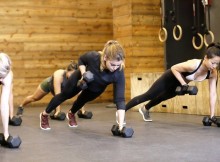List of Exercise Goals and Objectives
Advertisements
If January 1 is the only day you vow to improve your health, you are not alone. The annual commitment to exercise goals is exactly what motivates millions of people to start exercising. Make sure to set practical exercise goals. Unfortunately, it seems that the enthusiasm and perseverance for the beginning of a new year are often exhausted after just a few months. That's why setting realistic expectations for your exercise goals is one of the best ways to make sure you stick with and keep the changes you've made. If you think back to your days in primary school, you have to pass a fitness test. At the age of 10, you may not realize that the physical training goals that your PE teacher gives you scores, such as running a certain distance, participating in relay race, climbing rope or honing a certain number of sit ups, are similar to the current sports activity guidelines recommended for adults. In fact, the content of primary school physical education for you is directly related to the goal of physical activities set by the office of disease prevention and health promotion: improving health, fitness and quality of life through daily physical activities. In order to achieve this goal, the U.S. Department of health and human services has developed a sports activity guide, which recommends that adults have at least 150 minutes of moderate intensity aerobic exercise per week, or 75 minutes of high intensity aerobic exercise per week. In addition, two or more days of intensive muscle training involving all major muscle groups. It's no secret that the benefits of exercise are profound. The Mayo Clinic points out that some of the most important physical reasons for getting up and exercising include weight loss and maintenance, better sleep and reduced risk of certain diseases, such as stroke, heart disease and type II diabetes. It's not just physical benefits that make exercise a powerful tool for staying healthy. Mental and emotional professionals should also encourage you to set exercise goals. Experts from Harvard Health press say regular physical activity can improve mood, reduce stress, increase confidence and help control symptoms of depression and anxiety. Work or day-to-day activities, taking on the physical, physical, and mental demands of you, Eric bean, a psychological performance consultant, Ph.D., a member of the electronic board of cmpc and the association of applied sports psychology, told livestrong.com.
for most people, bean says that the primary goal is & 39; inspiring or inspiring enough to overcome what comes out of the sofa after a long day & L 39; why it and 39 are important to consider many "strong benefits" of physical health when setting fitness goals, find your "why". is at the heart of success. So, what are your reasons? &Well, it depends on everyone, but to a large extent, it's a deep motivation for why you want to lose weight, run 5K or increase muscle. Shannon roentved, Pound's director of education and certified personal trainer, told livestrong.com that relevance (part of intelligent goals) is the most basic standard in achieving goals for people who are just starting to exercise. She also pointed out that athletes and people with high levels of sports feel exhausted or lack of goals in daily exercise, which can also be achieved through exercise. Benefit from "why" defined in the goal. this is the opposite of many goals that focus only on exercise. &"Smart goals challenge people to think deeply about their exercise aspirations by setting goals and outlining plans in measurable steps," explains rentwell. What are smart goals? The concept of intelligent goals dates back to the early 1980s, when a business consultant used acronyms to explain how to write management goals. Although this goal setting approach was initially successful in the business world, it soon entered the fitness industry, where it is now one of the most commonly used tools for trainers to work with customers. The exact definitions of the letters are somewhat different, but generally speaking, smart stands for: Advertisements read more : 9 men's basic strength benchmark specific. &"Your goals should be related to your unique goals," bean said. For example, you don't want your goal to be shape, because shape is fuzzy. A more targeted goal might be to lose 10 pounds of fat and increase 5 pounds of muscle. &The more specific the goal, the closer it is to your personal mission, the better, he added. It can be measured. bean said that comprehensive goals like those mentioned above are not effective because they do not provide clarity. Instead, he points out that you want a goal that can be measured and objective. For example, you might say that I will walk my dog for 30 minutes on Monday, Wednesday and Friday. Bean explained that if the goal doesn't have a clear direction, the actions you are going to take may leave too much room for interpretation. For example, the goal of several training runs this week is admirable, but it is not clear what action is needed to succeed. On the contrary, bean said to set a goal of running three miles in an average eight minute mile, three times this week before Saturday. This is action oriented. reality. A goal that is impossible to achieve or requires too much sacrifice to achieve may reduce motivation and lead to inaction, said bean. Bean suggests that realistic goals should be challenging enough, require effort and focus, but not beyond the possibilities. time - limit. bean said that having a fixed time limit for goal achievement will increase motivation, generate some positive pressure, and clarify your goal period. For example, your goal is to perform 20 minute interval training three times a week in the next two months, and 60 minute strength training three days a week, so as to lose 10 pounds of fat and increase 5 pounds of muscle. "Smart goals" shows you how each training session fits into your overall goals, so you can focus on and motivate your overall goals and help you get more out of your training, "bean said. Examples of fitness goals & quot; fitness goals are achievable and sustainable, & quot; Dempsey marks, AFAA certified fitness coach and creator of peak fitness told livestrong.com. To reduce the chances of quitting smoking and giving up exercise goals, Mark says be realistic about the end result. that's why she suggests starting at a comfortable pace and slowly moving up a level or small goal. The best part of Marks & 39; advice is that it applies to all fitness goals, from beginners to elite athletes. to understand the appearance of sports goals, rentwell shared an example of using intelligent methods to achieve common fitness goals. Objective: to improve your overall fitness. Specific: you will improve your fitness level so that you can complete 5K training. Advertisements
Limited time: do you have a realistic schedule to achieve your goals?
When it comes to exercise, smart goals show you how each training session fits into your overall goals. This will not only help you focus on your primary goal, it will also help you get more motivation from your exercise. intelligent exercise goal




